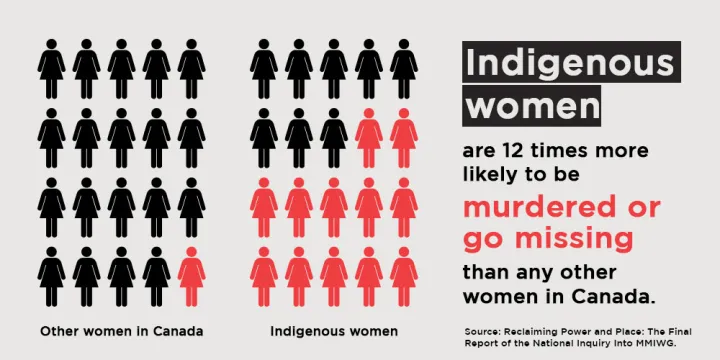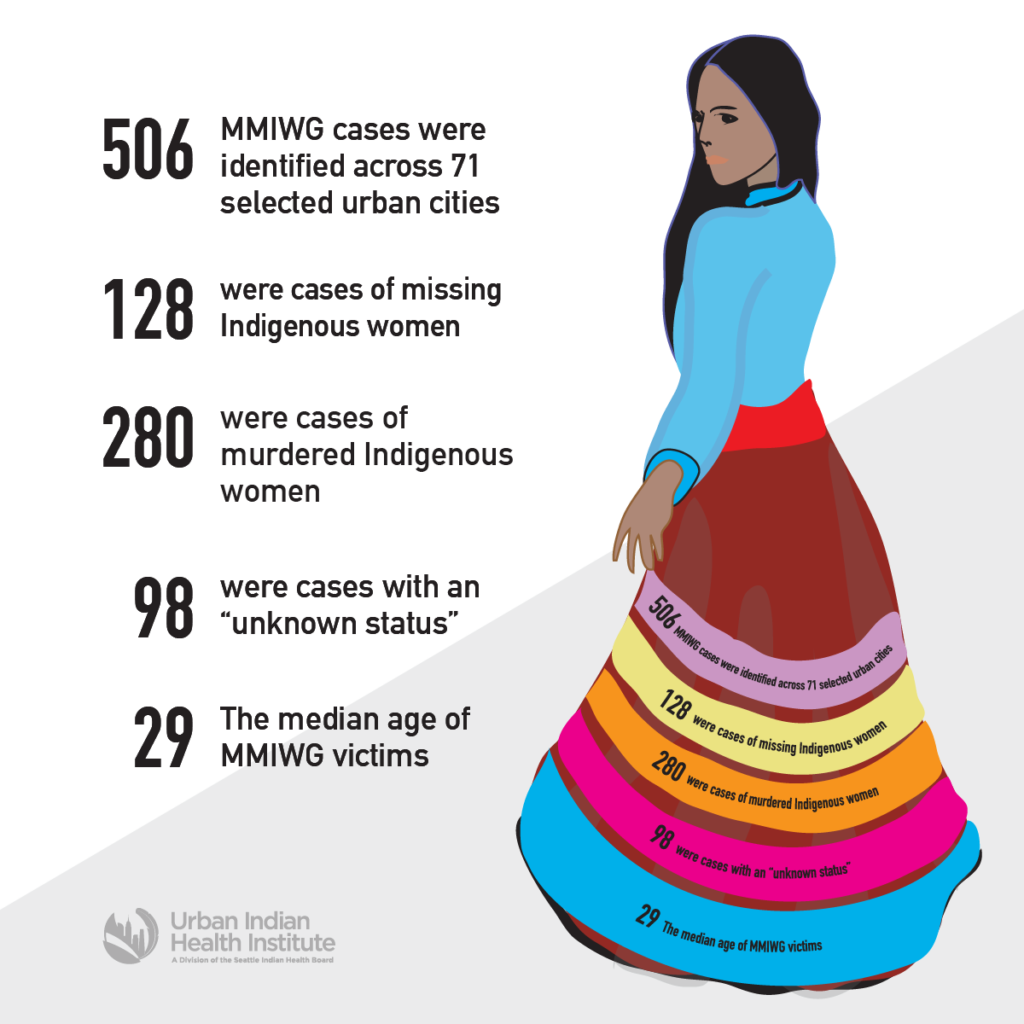Missing and Murdered Indigenous Women, Girls and 2SLGBTQQIA peoples (MMIWG2SLGBTQQIA) refers to a serious and troubling issue in Canada concerning the disproportionate and gendered violence against Indigenous peoples in Canada. This colonial violence affects Indigenous peoples and communities nationwide, garnering significant attention and calls for action.
Many Indigenous women, girls, and 2SLGBTQQIA have been victims of violence, exploitation, and disappearances, leading to devastating consequences for them, their families, and their communities. The term MMIWG2SLGTBQQIA encompasses both the victims whose lives have been tragically taken and those who have disappeared without a trace, leaving families without answers or closure.
This issue has deep historical roots, often linked to systemic colonialism, which causes issues such as poverty and discrimination. There have been calls for more effective measures to address and prevent violence against Indigenous women, girls, and 2SLGBTQQIA peoples and to ensure proper investigations when cases arise.
The recognition and understanding of MMIWG2SLGBTQQIA is crucial in raising awareness about this crisis and advocating for justice, healing, and protection of Indigenous women, girls, and 2SLGBTQQIA peoples from such colonial acts of violence in Canada. It highlights the need for ongoing efforts to address the underlying factors contributing to this systemic problem and to work towards building a safer and more equitable environment for Indigenous women, girls and 2SLGBTQQIA peoples in Canada.

Infographic on rates of women going missing or murdered
Credit: YWCA Metro VancouverThe Mandate of the National Inquiry
While the formal name of the Inquiry was the National Inquiry into Missing and Murdered Indigenous Women and Girls, their mandate covered all forms of violence. This made the mandate very broad. By not being limited to investigating only cases of Indigenous women who went missing or were murdered, we can include women and girls who died under suspicious circumstances. The National Inquiry into Missing and Murdered Indigenous Women, Girls, and 2SlGBTQQIA peoples in Canada officially began its work on September 1, 2016.
National Roundtable on MMIWG Participants committed to work with families and local partners to:
- Continue with coordinated collaboration and action to prevent and address violence against Indigenous women, girls, and 2SLGBTQQIA peoples.
- The importance of a national inquiry on MMIWG2SLGBTQQIA, with federal, provincial and territorial governments committing to participation and full cooperation in the process.
- Build on the current Indigenous Affairs Working Group to include the federal government as a co-Chair, with time dedicated to MMIWG2SLGBTQQIA issues including the ongoing coordination of efforts, monitoring progress, and identifying priorities for action, including appropriate F/P/T Ministers.
- Supporting the development of Indigenous-led cultural competency, anti-racism and anti-sexism training programs for all public servants across governments, police and the justice system to include components focused on Indigenous history, impacts of policies, legislation and historical trauma.
- Create and implement a set of common performance measures to assess progress toward addressing and reducing the socio-economic gaps experienced by Indigenous peoples.
- Work collaboratively to improve communication and coordination between Indigenous families and: communities; victim services; policing; prosecutions; women's groups; anti-violence groups; and shelter workers.
- Implement the proposed Canada-wide prevention and awareness campaign focused on changing public perception and attitudes to help end violence against Indigenous women and girls.
The primary goals of the inquiry were:
- Understanding the Issue: The inquiry aimed to comprehensively understand the root causes and factors contributing to the high rates of violence, disappearances, and deaths among Indigenous women, girls, and 2SLGBTQQIA peoples in Canada. It sought to examine the historical, social, and economic factors perpetuating this crisis.
- Seeking Justice and Closure: The inquiry sought to bring justice and closure to the families and communities of MMIWG2SLGBTQQIA. It aimed to provide a platform for the voices of the affected families to be heard, their stories acknowledged, and their demands for accountability addressed.
- Reconciliation and Healing: The inquiry aimed to contribute to the process of (re)conciliation between Indigenous and non-Indigenous peoples in Canada by shedding light on the systemic issues contributing to the vulnerability of Indigenous women, girls, and 2SLGBTQQIA peoples. It sought to facilitate healing and promote positive change within communities affected by the crisis.
- Recommendations and Solutions: The National Inquiry was tasked with making recommendations and proposing concrete solutions to prevent and address the ongoing violence and injustices faced by Indigenous women, girls, and 2SLGBTQQIA peoples. These recommendations were meant to inform government policies, programs, and actions to address the underlying factors behind the crisis.
Throughout its mandate, the National Inquiry conducted hearings, gathered testimonies, and engaged with Indigenous communities, families, and organizations across Canada to gather information and insights. The inquiry aimed to bring about meaningful change and ensure that the voices and experiences of Indigenous women, girls, and 2SLGBTQQIA peoples were heard and acted upon to prevent future tragedies.
The inquiry's work spanned several years, with the final report and recommendations submitted to the Canadian government on June 3, 2019. The Reclaiming Power and Place report provided a comprehensive examination of the root causes and systemic issues contributing to violence against Indigenous women, girls, and 2SLGBTQQIA peoples, along with recommendations for addressing the crisis and working towards [re]conciliation and healing. The inquiry's work was crucial in raising awareness, advocating for justice, and demanding action to protect and empower Indigenous women, girls, 2SLGBTQQIA peoples in Canada.

Infographic for MMIWG statistics from a survey of 71 cities across the U.S.
Credit: Urban Indian Health Institute, Missing-and-Murdered-Indigenous-Women-and-Girls-Report.pdf (uihi.org)- 506 MMIWG2SLGBTQQIA cases were identified across 71 selected urban cities
- 128 were cases of missing Indigenous women, girls and 2SLGBTQQIA peoples.
- 280 were cases of murdered Indigenous women, girls and 2SLGBTQQIA peoples.
- 98 were cases with an “unknown status.
- 29 the median age of MMIWG2SLGBTQQIA victims.